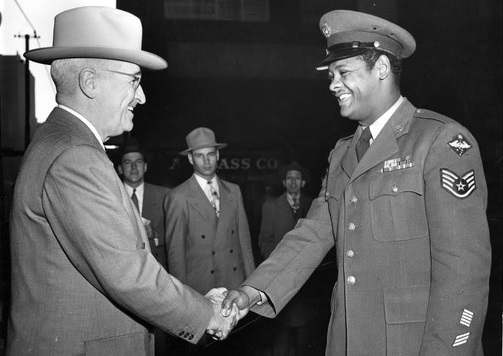
Background
African Americans have fought in every conflict in American history. Almost always, however, they were segregated into their own units. The 54th Massachusetts in the Civil War, The Buffalo Soldiers of the plains, and the Tuskegee Airmen of World War II are examples of how these men fought with courage and valor in these units.
This practice did however limit the ability of African Americans to be promoted, to have equal treatment, and to be recognized for their contribution. After World War II, African Americans began to demand that they be given life, liberty, and the pursuit of happiness in equal portions as white Americans as the Declaration of Independence promised.
They could not have been encouraged that the President of the United States, Harry Truman, was known to have the prejudices of his community when it came to views of race. He used racial slurs, told racist jokes, opposed sit-ins and intermarriage and called Dr. Martin Luther King a troublemaker. Whether he would act as President as he felt in private was not the question. It was assumed he would follow the lead of most other politicians of that time period and not show sympathy for African Americans’ goals for equal treatment.
To the astonishment of many, including many in his own party, on July 26, 1948 Harry Truman made one of the biggest contributions to date for racial integration and equality. In issuing Executive Order 9981 Truman ordered the desegregation of the armed forces. These documents trace what some call the beginning of the Civil Rights movement.
Key Question
Was Truman influenced by moral, public opinion, national interests, or political advice to address Civil Rights issues?
Materials
Documents to be examined:
- Letter from Mrs. Amelia A. Dixon to Harry Truman, March 12, 1948
- Letter, Roy Wilkins to Harry S. Truman, January 12, 1953
- Gallup Poll Results, 1948: Desegregation of Armed Services
- Correspondence between Harry S. Truman and Ernie Roberts, September 2, 1948
- Audio: Address before the NAACP, June 29, 1947
- Excerpt of Truman's Message to Congress, February 2, 1948
- Memo, Clark Clifford to Harry S. Truman, November 19, 1947